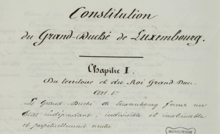
Back Constitució de Luxemburg Catalan Lucemburská ústava Czech Luxemburgische Verfassung German Σύνταγμα του Λουξεμβούργου Greek Constitución de Luxemburgo Spanish قانون اساسی لوکزامبورگ Persian Constitution du Luxembourg French חוקת לוקסמבורג HE Costituzione del Lussemburgo Italian Lëtzebuerger Constitutioun LB
Parts of this article (those related to the 23 October 2008 amendment(s), published December 2008) need to be updated. (November 2010) |
| Law of October 17, 1868 revising the Constitution of November 27, 1856 | |
|---|---|
 | |
| Overview | |
| Original title | Loi du 17 octobre 1868 portant révision de la Constitution du 27 novembre 1856 |
| Jurisdiction | Luxembourg |
| Ratified | 17 October 1868 |
| System | Parliamentary Monarchy |
| Government structure | |
| Branches | Three (executive, legislature and judiciary) |
| Head of state | Grand Duke |
| Chambers | Chamber of Deputies of Luxembourg |
| Executive | Grand Duke and their Government Prime minister as head of government |
| Judiciary | Constitutional Court |
| Federalism | No |
| Electoral college | No |
| First legislature | 17 December 1868 |
| First executive | Servais Ministry |
| Last amended | 2020 |
| Citation | Mémorial A n° 23 de 1868 |
| Location | Archives nationales de Luxembourg |
| Signatories | Gustave d'Olimart, Emmanuel Servais, Édouard Thilges, Henri Vannérus, Alexandre de Colnet-d'Huart, and William III of the Netherlands |
| Supersedes | 1856 Constitution of Luxembourg |
 |
|---|
The Constitution of Luxembourg (Luxembourgish: Lëtzebuerger Constitutioun/Verfassung; French: Constitution du Grand-Duché de Luxembourg; German: Luxemburgische Verfassung) is the supreme law of the Grand Duchy of Luxembourg. The modern constitution was adopted on 17 October 1868.[1]
Whilst the constitution of 1868 marked a radical change in Luxembourg's constitutional settlement, it was technically an amendment of the original constitution. That original constitution was promulgated on 12 October 1841,[2] came into effect on 1 January 1842,[3] and was acutely amended on 20 March 1848,[4] and again on 27 November 1856.[5]
Luxembourg first emerged as a legitimate principality in the 14th century.[6] It lived under successive Burgundian, Spanish, French, Austrian sovereignty, until 1815 when the Congress of Vienna erected it into a grand duchy and assigned it to William I, King of the Netherlands.[7] However, it was not annexed to the Kingdom of the Netherlands; instead, it formed a personal union within the German Confederation created by the Congress of Vienna.[7]
When the 1866 Austro-Prussian War led to the dissolution of the German Confederation, the Treaty of London (11 May 1867), which was drawn up in the resolution of the Austro-Prussian War, established the independence of the German-speaking part of Luxembourg.[7][8]
Through the political instability from 1815 to 1868, Luxembourg was governed by five different constitutional documents.[9] The recognition of Luxembourg as an independent state in 1868 called for yet another revision of the fifth Constitution of 1856. William III agreed to grant a more liberal constitution which went on to constitute the modern 1868 Constitution which is in use today.[9] The new Constitution confirmed the principle of constitutional monarchy and the international status of Luxembourg, declaring it to be an "independent, indivisible, inalienable and eternally neutral" state.[9] Although it was first adopted on 17 October 1868, the Constitution has since been amended many times in order to adapt with the evolving times.
- ^ (in French and German) "Mémorial A, 1868, No. 25" (PDF). Service central de législation. Archived from the original (PDF) on 27 September 2006. Retrieved 28 December 2006.
- ^ (in French and German) "Mémorial A, 1841, No. 51" (PDF). Service central de législation. Archived from the original (PDF) on 29 February 2012. Retrieved 28 December 2006.
- ^ (in French and German) "Mémorial A, 1841, No. 51" (PDF). Service central de législation. Archived from the original (PDF) on 29 February 2012. Retrieved 28 December 2006.
- ^ (in French and German) "Mémorial A, 1848, No. 23" (PDF). Service central de législation. Archived from the original (PDF) on 29 February 2012. Retrieved 28 December 2006.
- ^ (in French and German) "Mémorial A, 1856, No. 28" (PDF). Service central de législation. Archived from the original (PDF) on 29 February 2012. Retrieved 28 December 2006.
- ^ Doe, John (9 October 2017). "Historical development". Eurydice – European Commission. Retrieved 4 January 2022.
- ^ a b c "The Binding Effect Upon the German Empire of the Treaty of London of 1867 Neutralizing Luxemburg". American Journal of International Law. 9 (4): 948–958. October 1915. doi:10.2307/2187007. ISSN 0002-9300. JSTOR 2187007. S2CID 246007480.
- ^ In 1830, Belgium revolted against its union with the Netherlands causing Luxembourg to be divided between Belgium and Holland.
- ^ a b c Jean., Thill (2004). Constitutional Law of 15 EU Member States : the Grand Duchy of Luxembourg. Kluwer. OCLC 773788534.
© MMXXIII Rich X Search. We shall prevail. All rights reserved. Rich X Search